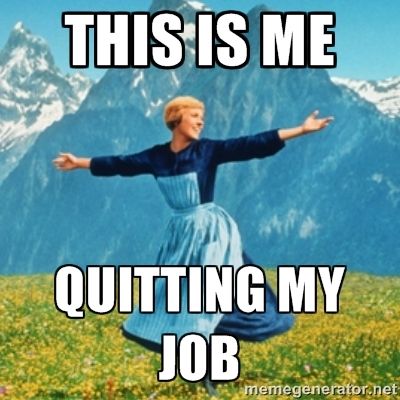|
Is the grass always greener on the other side? We quit our jobs with the idea of leaving for green pastures only to find out that the new job we just landed is just as bad if not worse than the last. Yikes! Why does this happen? Simply, we made a decision without fully understanding the ‘why’ behind it. When we’re at a point in our careers where we’re considering leaving our employer typically one or more of the following is happening:
Sound familiar? These are the top five answers people share on why they resigned from their employer. When we’re frustrated at work, especially if it has been going on a while, all too often we’re ready to jump ship without checking first if we have a life preserver on. The first opportunity that comes along meeting our ‘minimum qualifications’ can appear to be a god send. We yell out, “where have you been all my life” as we go through the interview process with our new prospective employer hoping they’ll give us the chance to say “Adios” to our current employer. But wait! How much research and investigation did we do ahead of time to ensure our hopeful new employer is better than the last? Does it meet our needs? Do we even know what our needs are? Here in lies the trap many of us fall into. We convince ourselves that what we have (our job or employer) is crap and anything else that presents itself is therefore exceptionally better than the last. We dive into the new opportunity to get away from the old to find ourselves quickly back into the same situation we were in before. How could this be? (it certainly isn’t our fault because it never is) Sorry to be the bearer of bad news – if you’ve experienced this it is indeed your fault. Now, let’s be fair, maybe no one ever taught you how to go about finding a new job and ensuring it met your needs. If that’s the case consider this first situation ‘my bad’ and moving forward use the following steps to better understand what you need and how to get it with a new job: Step #1: Self Reflection – take time to better understand where your unhappiness comes from. Without knowing this it will be very difficult to improve your situation Step #2: Honesty – are you giving your current job everything you can? If not then you’re putting yourself at risk of running from one issue to another, just at another company Step #3: List Your Expectations – write out a list of 5-10 things you want in a career and employer. Your top #1-3 should be non-negotiable no matter what Step #4: List of New Employers – if you’ve decided it’s time to move on build a list of companies in the area you want to work which meet your needs, at a minimum your non-negotiables. This information can be obtained by speaking with current employees of those companies or reading reviews online. Step #5: Network – this is the biggest misstep of all. Many times we don’t do this which means we aren’t getting a good enough perspective of what is going on within the industry we want to work in. Networking builds our connections and insight for businesses in the area we’re trying to find our next employment. It can also help us land a new gig. Step #6: Confirm Expectations – when you get to the point of interviewing with a new company make sure to ask them how they show up with the list of items you have created that are important to you. Ask every person you meet within the company. If their answers don’t jive with your expectations this isn’t the right company for you. Step #7: Show Up – if you do decide to take a new job with a company that meets your new set of expectations it is imperative that you show up and give them everything you’ve got. 150%. During this time you should also be making mental notes to see if your new employer is in fact upholding their commitments to your expectations. Caution – when you’re new it is a 50/50 split of responsibility where both parties have to come to the table to make the employer/ employee relationship work. Don’t just sit back and expect your new employer to drool all over you and praise you without you showing up in the new job accordingly. Praise, respect and opportunity are earned – never given for free. Unhappy at your job? Looking for a new one? Before you act on it make sure you understand why you’re in your present situation before you get into a new one. Once you know what you want it will be much easier to find the right opportunity rather than the first opportunity.
0 Comments
Quit Your Job Without Creating Enemies12/5/2016 My father once shared some sage advice with me: “never burn a bridge”. I’ve been consistently amazed at how small a world it can be as I often times run into former colleagues, clients and friends who I shared a past relationship with to varying degrees from a past life. When I bump into these past connections its uncanny how often I find out the person I knew prior now has a direct ability to impact my current life, professional and personal. This is the prime reason I firmly believe one should never burn a ‘relationship’ bridge. What about when we have to quit our job? January and February represent the highest attrition months of the year, meaning the largest percentage of resignations and terminations occur within these two months. Why does this happen? Companies and employees alike are looking at the New Year and wanting to start fresh which typically means getting rid of employees that aren’t cutting the muster or employees themselves who leave jobs that have lost their luster. When we’re the one to make the decision to quit our job it can be fun to think about the moment you deliver the news, after which you imagine yourself singing and dancing through the office like you’ve just won the lottery while your colleagues look at you like you’ve lost your damn mind. We experience our very own Jerry Maguire moment and we’re all too thrilled to ask everyone around us “who’s coming with me”. In these moments are we thinking about how our actions will impact our future? Some of us do, however there is a rising majority of people that seem to forget that the way we handle our resignation may or may not pay dividends in the future. If you plan to quit your job in the near term use these steps to deliver the news to your employer while leaving gracefully. Step 1: Quit before things get bad Often times we wait too long to quit a job that we know isn’t right for us. If you wait too long you risk your reputation suffering as often times our productivity begins to lessen as we aren’t as passionate about the job as we once were. Step 2: Don’t tell anyone It’s a big mistake telling colleagues you’re quitting before you’ve actually delivered the goods. The last thing you need is your boss to find out you’re quitting before you’ve actually confronted them with the news. Step 3: Be professional but save the novella It’s a good idea to inform your employer about why you’re leaving and perhaps even some small detail on where you’ll be going. Anything after that and you’re just wasting time and energy. This is not the time to spill the beans on all of the crap you hated about your job, the company or your boss, creating a drama tornado in the process. If you work for any sizable company HR will typically ask for this information however it does nothing to serve you for the future, it only serves their interests and that isn’t your problem anymore. The time to give feedback was when you were fully employed, not when you’re exiting. Step 4: Make it official Your resignation should be given to your direct boss and no one else. Be sure to provide him or her with a formal, typed out resignation. Google ‘resignation templates’ and you’ll have all the options to your hearts’ content. Step 5: Respect & professionalism at all times What’s most important to remember while you’re going through the resignation process is your professionalism will be noted by almost everyone involved. If you plan to continue working in the same industry or similar industry you’re current job is in more than likely you’ll run across your company’s employees in the future. For this reason and many others it’s important to be respectful to whoever is involved, which also means providing at least a two week notice to your employer. Also, you should never gossiping or talk ill about your boss or company after you’ve left. All that does is make you look bad in the process, which includes going online to rant about how thrilled you are to not work there any longer. Step 6: Keep it classy I once had an employee of mine who had quit send me a letter several weeks after the fact thanking me for the time she spent on my team while also sharing what she learned. I was really impressed by this because it signaled that while the job wasn’t for her any longer she did appreciate the opportunity while she was here. In the end, we all will be judged by our actions so it’s best to remember these sage words… “Never burn a bridge!” About the AuthorTravis Smith is the founder and managing director of Square-1 Engineering, a medical device consulting firm, providing end to end engineering and compliance services. He successfully served the life sciences marketplace in SoCal for over 15 years and has been recognized as a ‘40 Under 40’ honoree by the Greater Irvine Chamber of Commerce as a top leader in Orange County, CA. Categories
All
Archives
July 2024
|
Visit Square-1's
|
|



 RSS Feed
RSS Feed


